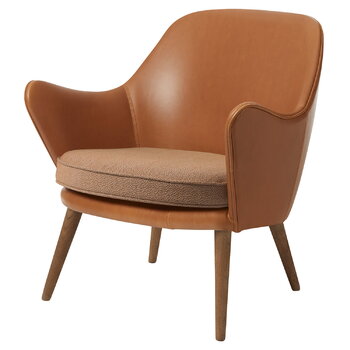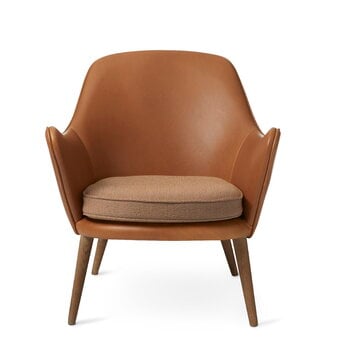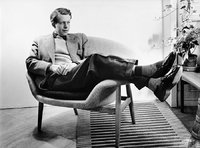Warm Nordic's Dwell armchair is the work of Danish architect and designer Hans Olsen from 1956. Typical of the era and Danish modernism, Dwell is delicate, graceful and airy both in form and proportions; the inviting shape of the armrests urge you to curl up and dwell in its gentle embrace. The Dwell armchair is available in a number of upholstery options ranging from classic boucle fabrics and leather to textiles made from recycled fibers.
Dwell armchair, cognac leather - Sprinkles 254
Warm Nordic
Description
Warm Nordic's Dwell armchair is the work of Danish architect and designer Hans Olsen from 1956. Typical of the era and Danish modernism, Dwell is delicate, graceful and airy both in form and proportions; the inviting shape of the armrests urge you to curl up and dwell in its gentle embrace. The Dwell armchair is available in a number of upholstery options ranging from classic boucle fabrics and leather to textiles made from recycled fibers.
Product details (14)
- Colour
- Cognac
- Width
- 68 cm
- Depth
- 76 cm
- Height
- 73 cm
- Seat depth
- 53 cm
- Seat height
- 45 cm
- Frame material
- Wood, webbing
- Seat cushion
- Foam
- Upholstery fabric
- Frame: Silk 0250 aniline leather, seat: Sprinkles 254: 40% polyester filling, 30% new wool, 20% polyester, 10% nylon
- Abrasion resistance
- Sprinkles: 80, 000 Martindale
- Pilling
- Sprinkles: 4
- Lightfastness
- Sprinkles: 7
- Base material
- Smoked solid oak
- Care instructions
- Vacuum clean frequently. Remove stains as soon as they occur.
- Product ID
Designer
Hans Olsen (1919-1992) was a Danish furniture designer who is famous for his experiments with bent, laminated wood. Olsen was a student of the noted designer Kaare Klint at the Royal Danish Academy, and he developed a distinctive style by combining classic references and organic lines with a touch of humour. The Balloon lounge chair, released in 1955, is a fine example of his work.
View all productsReviews (0)
Sustainability
The Product Sustainability Framework, our criteria of sustainable design, helps you find the most sustainable products in our selection. Read below which sustainability criteria this product has met.
Working conditions & labour 9/9
-
Equal opportunities for all employees
-
Commitment to UN Global Compact, fair compensation for all employees
-
Corporate responsibility requirements defined and communicated for suppliers
-
Systematic work for improved inclusion and well-being in the workplace
-
Transparent supply chain
-
Suppliers' compliance to a code of conduct ensured
-
Direct suppliers audited and certified
-
Compliance to the UN Guiding Principles on Business and Human Rights ensured in the supply chain
-
Support for community involvement in the supply chain
Eco-friendly production 7/9
-
Fair and resource-wise water-use in production
-
No incineration or landfilling of returned items
-
No use of endangered species as materials
-
No direct environmental emissions or waste (excl. GHGs) from production
-
Material-efficient and ecological packaging
-
Positive impact on nature’s well-being through operations that regenerate natural ecosystems
-
No potentially harmful chemicals used in own production
-
The sustainability of direct suppliers' production is addressed and monitored
-
Production and material sourcing that respect biodiversity, animal rights, and natural ecosystems
Climate impact 4/8
-
Company's direct greenhouse gas emissions identified and commitment to reduction
-
Product's carbon impact identified and commitment to reduction
-
Guidance on energy- and eco-efficient use of the product
-
Contribution to climate initiatives beyond the brand’s direct operations
-
Low-carbon or compensated transportation
-
Carbon footprint of the product calculated and goals set to reduce it
-
100 % renewable energy in own production and operations
-
Carbon neutral or carbon negative product
Sustainable materials 4/6
-
Sustainable and long-lasting material choices
-
No harmful or hazardous substances
-
Responsible raw material sourcing and production
-
Materials suited for circularity: monomaterials, recyclable finishings, renewable or recycled contents etc.
-
Ecological materials: natural, biodegradable, recyclable or recycled contents
-
Outstanding materials in terms of innovativeness, responsibility, sustainability and circularity: local production or sourcing, 100 % recycled content, C2C-certification etc.
Circular design 4/5
-
High aesthetic quality promoting long-term use of the product
-
Technically durable product design and material choices
-
Design for enduring life-long quality
-
Design and support for product maintenance, repair and upgradability
-
Innovative circular design solutions: circular service system, resale platform, remanufacturing, collection of used products, etc.







